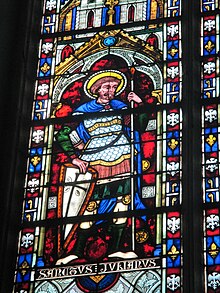Julian of Brioude

Julianus von Brioude , French Saint Julien de Brioude (* probably in Vienne ; † probably around 304, executed near Brioude , both Gaul , Roman Empire ) was a Christian martyr and is venerated as a saint by the Catholic Church . His grave is in the collegiate church of Saint-Julien in Brioude, which is dedicated to him , his name day is August 28th .
Life
Little is known about Julianus' life. He is said to have come from a noble family from Vienne and served as a Christian soldier under the also Christian tribune Ferreolus in the Roman army . During the persecution of Christians by Diocletian in 303 , which was carried out in the region by a governor named Crispinus , Ferreolus advised him to hide in order to later support the surviving Christians. Julianus therefore fled to Brioude in the Auvergne and hid there in a hut with old people. When his hiding place was discovered, he presented himself in order not to endanger his supporters and was shortly afterwards executed by beheading . His severed head was washed in a nearby spring by the soldiers who had killed him and then brought to Vienne to Crispinus, who had him handed over to Ferreolus. The headless trunk, however, was brought to Brioude and buried nearby. Ferreolus died shortly afterwards as a martyr and was buried together with the head of Julianus.
As with most saints, it is extremely doubtful whether these traditional statements are correct, since the focus of the lives of saints is not on historical facts but on edifying narratives. At that time, Gaul was also under the control of Constantius Chlorus , who actually did not have any Christians executed. The martyrdom of Julian, however, is mentioned by Sidonius Apollinaris and later by Venantius Fortunatus .
Miracles and veneration of saints

Soon after Christianity was established ( Constantinian turning point in 313), numerous miracles were attributed to Julianus , which led to a rapidly growing veneration of saints : The two old men Arcons and Ilpize , who buried him, are said to have regained their youth as a result of this act. The spring in which Julianus' head was washed has been said to have healing powers. A woman prayed at the martyr's grave and asked to see her husband, who was trapped in Trier , safe and sound. After fulfilling her request, she had a cell built next to the grave . So the place soon became the most visited place of pilgrimage in Gaul, along with the grave of St. Martin in Tours . From the 5th century, Julian was the patron saint of Auvergne. Bishop Mamertus von Vienne († around 477) rediscovered the head of Julian and the bones of Ferreolus and venerated them as relics . Germanus von Auxerre set August 28th as the name day in 431 after visiting the grave. The Western Roman Emperor Avitus wanted to be buried next to the saint in Brioude. Even Gregory of Tours († around 594) attended in his youth Julian 'grave and became supposedly exempt from severe headaches. He wrote about Julianus the work "Liber de passione et virtutibus sancti Juliani" , which reports on the life and veneration of the saint and is the most important source despite the lively, exaggerated narrative style.
During the time of Gregory the pilgrims came to Brioude in such large numbers that even the basilica, which was newly built towards the end of the 5th century, was no longer sufficient. After the church was destroyed by a Saracen invasion , it was rebuilt as a collegiate church in the Middle Ages (for the church, see Collegiate Church of Saint-Julien (Brioude) ).
In addition to Brioude and Vienne, Julian was venerated in numerous other French cities, including Tours, where a relic was and Paris , where there is the church of St-Julien-le-Pauvre , which was initially dedicated to Julian of Brioude (but later to Saint Julianus intern ). He is also venerated in Italy, for example as the patron saint of the communities of Barbania and Baldissero Torinese in Piedmont .
Julianus von Brioude is considered to be a helper of the deaf , blind , mute , paralyzed and possessed , furthermore he is invoked as an avenger of perjury and for the recovery of lost things.
literature
- Bernhard Kötting: Julianus von Brioude. In: Biographisch-Bibliographisches Kirchenlexikon (BBKL). Volume 3, Bautz, Herzberg 1992, ISBN 3-88309-035-2 , Sp. 791-792.
- zeno.org : Complete Lexicon of Saints, Volume 3. Augsburg 1869, pp. 529-530: Julianus, p. (82)
Web links
| personal data | |
|---|---|
| SURNAME | Julian of Brioude |
| BRIEF DESCRIPTION | Christian martyr and saint |
| DATE OF BIRTH | 3rd century |
| PLACE OF BIRTH | Vienne |
| DATE OF DEATH | at 304 |
| Place of death | Brioude |